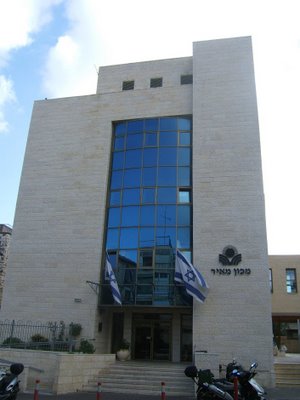I'm a yehudi pashut, a simple Jew. I know the basic laws of Shabbat (sabbath), Kashrut (kosher,) Tefillah (prayer,) Tzniut (modesty), Tzedukkah (charity), and the details of living a proper Jewish life. I'm a Shulchan Aruch Jew. When I have a question, I look it up in the Shulchan Aruch (literally, "Set Table,") the code of Jewish law, a brief compendium spanning only four volumes and hundreds of pages with the gist of Jewish law as practiced. Well, actually, I consult an English abbreviation of the abbreviated version of the Shulchan Aruch. When I have a question to which I can't find a quick answer, I consult a competent rabbi. It's good enough, but I can do better.
Having worked out my daily routine, I found that I had several hours of free time every morning. I had two choices; I could either try to find an Ulpan to improve my Hebrew, or find a Yeshivah, an institute of Jewish learning. All of the Israelis with whom I speak tell me that my Hebrew is impeccable, and although I know it needs serious improvement, I'm finding that I know enough to do all of the routine business of Israeli living. So I decided to start spending some serious time learning in Yeshivah. The word Yeshivah is based on the word Yoshev, to sit, since one studying in Yeshivah is generally sitting on their laurels all day. One can sit in Yeshivah and study for smichah, rabinnic ordination, or for certification as a Jewish educator, or for any number of Jewish jobs, like Kashrut inspector, scribe, kosher slaughterer, etc. But in my case, as in many cases, the purpose is simply to elevate one's self and the Jewish people by fulfilling the mitzvah (commandment) of Torah study.
So the next question was where to study. Jerusalem has probably thousands of Yeshivot, and picking one out was no small task. There are yeshivot for lay people, yeshivot for professionals, yeshivot for the newly religious, born religious, born-religious-then-stopped-being-religious-then-became-religious-again, yeshivot for the blind, yeshivot for those who are already rabbis, the list goes on forever. Then, of course, there are the different types of Jews. There are Sephardim (Jews from Muslim Countries) and Ashkenazim (Jews from Christian/Western countries), there are Chassidim and Misnagdim. And within the Chassidim there are a myriad of types of Chassid, each from a different town it the old country.
After much consideration, I called a Rabbi I met in the states who teaches at Machon Meir, a Dati Leumi (National Religious) outreach-oriented yeshivah in the Kiryat Mosheh neighborhood of Jerusalem. While their main program is in Hebrew, as part of their outreach they have departments in English, French, Spanish, Russian, and German. I was a bit hesitant to go in at first because I had been warned more than once of the yeshivah's political leanings, but once I sat down to my first shiur (lesson,) I knew I was in the right spot. The English shiurim are of the same or better quality than those I've seen in my brief tenure at other yeshivot, and the group I'm with is an excellent bunch of quality guys. English being the international language, our group hails from all over the world, including Brazil, Germany, Switzerland, Turkey, and Greece to name a few. And as for the political leanings, they are much less pronounced than I was told. If and when they do show, they're right in line with mine (keyword: right), so it feels more like a pat on the back than a slap in the face.
At first, I was concerned about time issues, given that I work and that the bus takes over an hour each way. It came up in conversation with Cousin Rafi that I'm learning in Kiryat Moshe. Turns out, so is he! He studies from 9AM to 1PM at kollel (yeshivah for married men,) so I can generally hitch a ride with him or with his father and be dropped off two blocks from the Yeshivah. I then explained my working situation to the directors, as well as my desire to improve my Hebrew while still learning Torah, and we were able to agree on a schedule with some English classes and time for Hebrew study as well. So now, I learn anywhere from three to six hours a day and work afternoons and evenings. Torah learning is something I've always wanted to do, a sheer pleasure, and quite a fulfilling experience.

 Daniel (from Holland) and Ephraim (from Germany/Greece)
Daniel (from Holland) and Ephraim (from Germany/Greece) Daniel's tea kit (He's an herbal therapist)
Daniel's tea kit (He's an herbal therapist)







No comments:
Post a Comment